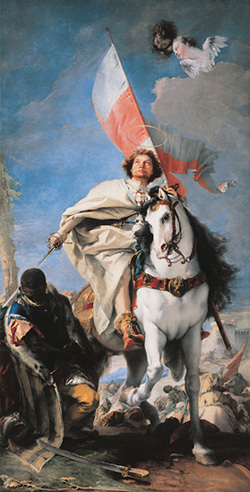
September 17, 2012

St. James at the Battle of Clavijo by Tieopolo
Meanwhile, a forgotten incident in art history directly bears upon embassies, apostasy, and accommodation to Islam.
The year was 1750.
Giovanni Battista Tiepolo (1696-1770) was the greatest painter of the Venetian school. In 1749, at the height of his international renown, he was commissioned to produce the altarpiece for the chapel at the Spanish embassy in London.
Presented in the summer of 1750, Tieopolo’s St. James the Greater at the Battle of Clavijo portrays Spain’s patron in his role of Matamoros, the Moor-slayer. At Clavijo on May 23, 844 AD, the Christians were reputedly outnumbered by their Islamic foes.
As the story goes, St. James miraculously appeared on the battlefield, routing the Moors and saving Western Europe from slavery 800 years after the apostle’s martyrdom by the sword in Jerusalem under Herod Agrippa.
 Tiepolo has the ruddy figure of St. James astride a beautiful white horse. The martyr’s serene and resolute gaze looks upward to signify that his force is derived not from arms, but from heaven.
Tiepolo has the ruddy figure of St. James astride a beautiful white horse. The martyr’s serene and resolute gaze looks upward to signify that his force is derived not from arms, but from heaven.
In his right hand he bears a sword, the instrument of his own martyrdom. It serves as a mysterious channel of grace reaching downward to the defeated Moor, whose shoulder it lightly touches as if lifting him from the ground. The Moor’s attitude is that of the convert resigned to a higher love, a kneeling postulant for baptism to whom life is given, not removed.
It was by conversion, not war, that Spain became Christian, though she may have defended herself through might whenever necessary.
In the background of Tiepolo’s generous canvas, death is dealt to those attacking the children of God. In the foreground, the scimitar and Islamic flag lie upon the dusty ground, contrasting with the victorious banner of the Virgin Mary’s colors held high in the saint’s left hand.
We can only speculate as to why so marvelous a work was rejected by its own commissioners. (It now hangs proudly in Budapest’s superlatively gorgeous Szépmüvészeti Múzeum.)
In 1750, Anglican visitors to London’s Spanish Embassy would likely have sympathized less with Catholicism than they would have with Islam.
In receiving news of the rejection, Tiepolo must have been surprised to learn that Anglo-Saxon civilization had finally extinguished itself…
…the fate of all societies whose art is powerless to vanquish hell because it no longer looks to heaven.
Nations are only as good as their art, their art only as good as their faith, and their faith only as good as the object of their faith.